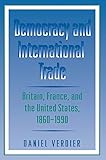Democracy and International Trade : Britain, France, and the United States, 1860-1990 / Daniel Verdier.
Material type: TextPublisher: Princeton, NJ : Princeton University Press, [2021]Copyright date: ©1995Description: 1 online resource (408 p.) : 11 line illustrations, 15 tablesContent type:
TextPublisher: Princeton, NJ : Princeton University Press, [2021]Copyright date: ©1995Description: 1 online resource (408 p.) : 11 line illustrations, 15 tablesContent type: - 9780691228181
- 382/.3/0941
- online - DeGruyter
| Item type | Current library | Call number | URL | Status | Notes | Barcode | |
|---|---|---|---|---|---|---|---|
 eBook
eBook
|
Biblioteca "Angelicum" Pont. Univ. S.Tommaso d'Aquino Nuvola online | online - DeGruyter (Browse shelf(Opens below)) | Online access | Not for loan (Accesso limitato) | Accesso per gli utenti autorizzati / Access for authorized users | (dgr)9780691228181 |
Browsing Biblioteca "Angelicum" Pont. Univ. S.Tommaso d'Aquino shelves, Shelving location: Nuvola online Close shelf browser (Hides shelf browser)

|

|

|

|

|

|

|
||
| online - DeGruyter Cosmic Understanding : Philosophy and Science of the Universe / | online - DeGruyter Economic Crisis and Policy Choice : The Politics of Adjustment in the Third World / | online - DeGruyter Medicine, Mind, and the Double Brain : A Study in Nineteenth-Century Thought / | online - DeGruyter Democracy and International Trade : Britain, France, and the United States, 1860-1990 / | online - DeGruyter A Phoenix in the Ashes : The Rise and Fall of the Koch Coalition in New York City Politics / | online - DeGruyter The Princeton Handbook of Multicultural Poetries / | online - DeGruyter Working-Class Formation : Ninteenth-Century Patterns in Western Europe and the United States / |
Frontmatter -- Contents -- List of Tables and Figures -- Preface -- Introduction -- PART ONE: A POLITICAL THEORY OF INTERNATIONAL TRADE -- One Trade and the Voter: A Survey of the Existing Literature -- Two The Electoral Regulation of Access -- Three The Trade Policy Process: A Typology -- Four Origins of the Trade Policy Process -- Five The Making of Trade Policy -- PART TWO: THE MAKING OF TRADE POLICY IN BRITAIN, FRANCE, AND THE UNITED STATES, 1860-1990 -- Six The Case Studies -- Seven Descent into Depression, 1860-86 -- Eight Crisis and Response, 1887-1913 -- Nine The First World War, 1914-18 -- Ten Tariff-Making and State-Building, 1919-39 -- Eleven Creation of the Cold War Trading Regime, 1940-62 -- Twelve The Rise and Fall of Industrial Policy, 1963-89 -- Thirteen Conclusion -- APPENDIXES -- Appendix One Mathematical Appendix to Chapter Two -- Appendix Two Tariff Levels -- Appendix Three Partisan Bias in Voting on Trade Bills -- Notes -- Bibliography -- Index
restricted access online access with authorization star
http://purl.org/coar/access_right/c_16ec
In this ambitious exploration of how foreign trade policy is made in democratic regimes, Daniel Verdier shows that special interests, party ideologues, and state officials and diplomats act as agents of the voters. Constructing a general theory in which existing theories (rent-seeking, median voting, state autonomy) function as partial explanations, he shows that trade institutions are not fixed entities but products of political competition.
Mode of access: Internet via World Wide Web.
In English.
Description based on online resource; title from PDF title page (publisher's Web site, viewed 30. Aug 2021)


